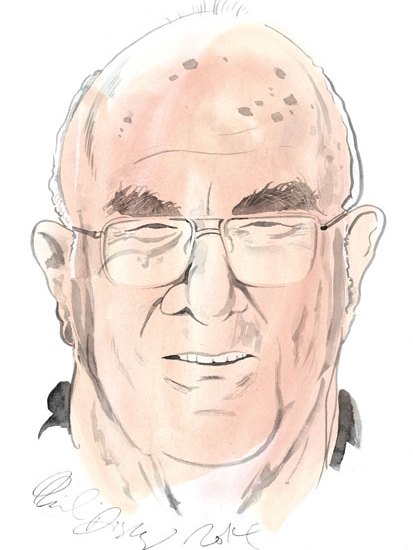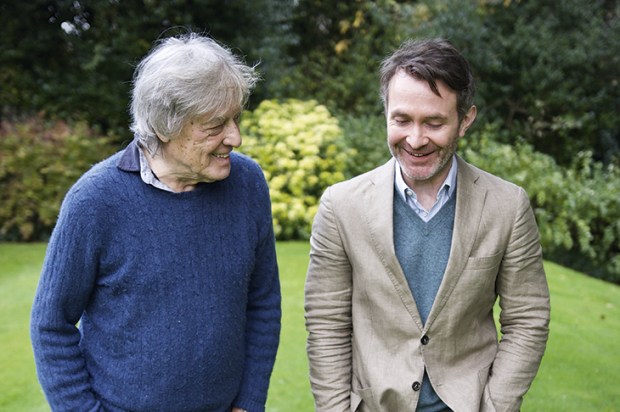Clive James has published a new poem days before we meet. It opens, ‘Your death, near now, is of an easy sort’. It is about a Japanese maple his daughter has planted in the garden of his Cambridge home where we are sitting, and whether the poet will live to see the leaves flame red this autumn. The poem has made news.
‘At the moment,’ he says, laughing, ‘I am in the slightly embarrassing position where I write poems saying I am about to die and I don’t. My wife is very funny on that subject.’ It is part of an astonishing late body of work. This month there is a new book of writing on poetry, Poetry Notebook. He still hopes to live to see a new Collected Poems out next year, perhaps finish a final volume of memoirs and write a sequel to his immense 2007 work Cultural Amnesia.
‘Although I have only got half my energy I am probably writing at the rate I always should have. But other things got in the way. I liked those other things, I don’t blame them for getting in the way. But I am in ideal conditions now so there is no excuse for not getting on with it. The only drawback is I don’t really know when it will all get switched off. You see the trouble with this thing, I have a lot of things, as you can hear, but the one that you can’t see is the one that’ll get me, it’s a brand of leukaemia. It’s a nifty little fella. It can get beaten into remission, but it gives no indication of when it’s coming back. When it comes back, that’s when you have to fight. My chest I fight all the time. I have only just finished a bout of pneumonia — any infection turns to pneumonia almost instantly but the leukaemia will put a limit on things.’
In Cambridge he is close to his family and also to Addenbrooke’s hospital, where he receives treatment. Yet here are these amazing works, highly praised, technically and emotionally heart-stopping poems reflecting gratefully on a life, as well as a recent translation of Dante. ‘I am getting the kind of praise now that poets dream of,’ he admits. ‘I wonder if you have to be standing on the edge of a cliff to get it, though. Has that occurred to you? If that’s true everyone will start doing it! Look, no parachute!’
James’s famous voice twinkles even in his weakened state. But we dare to venture into the garden only briefly on this bright September day. ‘I can’t really see anyone for longer than about an hour and the trouble is — this is great, I’m loving this — but the trouble is, loving it is what wears you out, so the more successful your conversation, the more it is likely to be prostrating in the aftermath. It’s a terrible pity but I lasted this long so I give thanks.’
Aside from writing poetry he talks and writes about poetry with an enthusiasm which must have been embedded early. He did the usuals — Gray’s Elegy and Dorothea Mackellar — while a schoolboy in Kogarah. How would he set a child off on it now? ‘Forbid it and penalise it and jail anybody that’s caught dealing in it and give severe punishments to anyone caught reading it and then it will be popular.’
He caught it fully himself at university: Auden, Eliot and, back then, Pound. He says in Poetry Notebook, ‘There is always more room in the pantheon, because the pantheon is not a burial chamber for people who have said things, it is an echo chamber for things that have been said.’ At Sydney, ‘I would pop around corners of buildings and jump out of bushes at the university reciting E.E. Cummings. I was lucky to be at university. There was a great change going in Australian society because [Robert] Menzies, a conservative prime minister, had done a revolutionary thing, his government created the Commonwealth Scholarship Scheme, which meant for the first time that anyone could go to university. In a previous generation, if you didn’t have the money, your family didn’t have the money, you couldn’t go.’
You sometimes hear it claimed that James’s omnivorous intellect, like that of Peter Porter, came partly with the passage from Australia. In a 2010 obituary for Porter, James describes how his friend spent much of his life ‘punished in Australia for trying to please the Poms, and punished in the UK for being an Aussie expatriate with a frame of reference above his station’. Did James feel that too — that somehow he had to do more? ‘That’s not national, that’s personal,’ he says. ‘I just felt I owed it to the ruins of my family, I owed it to my mother and father, for the life they might have had, to do what was within me.’
He was born in 1939, and was an only child. His father survived the war, but the plane bringing him back crashed on the way home. The passage describing this in James’s first volume of memoirs, and the poem he wrote on visiting his father’s grave later, are both devastating.
‘I was born into it,’ he says. ‘Just when I was being born the massacre was actually already on in Poland, and while I was a little kid, trainloads of children were getting gassed. When I found out, it formed my worldview. My worldview isn’t formed by my personality. I like to think I am a merry man who has a good time, spreading laughter all around. But that’s not my worldview. My worldview is tremendously pessimistic. I think it’s a miracle we’re here, considering what human beings can do to scorch the earth. Democracy itself is a miracle.’ He claims no prescience, but of the 1960s student rebels he says, ‘I knew they were talking bullshit, but I didn’t realise to what extent they were talking bullshit. There was something about the way the enthusiasts for China wrote that told me the whole thing was a bill of goods. Then the facts started to come out and they were there if you wanted them. There is a crucial stage in big alterations of opinion on a world scale where the facts are there but people don’t yet want them, and sometimes you just have to wait.’
What are the facts we are waiting for now? ‘Watch out for the deep water. I don’t want to get into the middle of a jihad. But we’ve known for a long time now that the Islamic cultures and countries were the enemies of women and women’s rights, but not even our feminists made anything of it until quite recently. It took a few unbelievably brave Islamic feminists to say these things. All this has been available but it just took time to come out because it’s too uncomfortable. Now it must, I think.’ His political worldview is neither right nor left, but consistently and straightforwardly anti-totalitarian.
I remark how lucky his generation has been. ‘You’re not kidding. We’ve gone all the way through without a single war we had to go to. I used to illustrate it with the image of Buster Keaton standing there with the facade of a house behind him and it falls forward and the doorway which is empty fits just over him. That was us — the whole fucking house fell in and it didn’t hit us. It is a stroke of luck I think you have to pay back if you can.’
It requires an awful discipline to leave him. We talk of friends living and dead, the power of ideas and how particular writers like Robert Conquest have changed history. His talk is Eichmann and Stalin, but also Auden, Eliot and Les Murray. He scorns a description of himself as a pioneer. ‘If you stick around long enough, you end up being a pioneer of everything. You practically invented ice cream.’
What has he learned along the way? ‘Well I learned the hard way to drink moderately and don’t smoke.’ And of course he learned how to work. ‘I have seen very talented people waste themselves, it’s a terrible spectacle, people I’ve known. I don’t know how they can do it. It’s like not really understanding how people can commit suicide — although sometimes when you look at the world you wonder why everybody doesn’t.’
He speaks of his daughters and wife with a quiet, touching pride. And what about him, I ask, as we steal a final minute outside his library, looking over the maple tree. Did he get what he wanted from this life? ‘Oh yes,’ he replies. ‘More than I deserved.’
Got something to add? Join the discussion and comment below.
Get 10 issues for just $10
Subscribe to The Spectator Australia today for the next 10 magazine issues, plus full online access, for just $10.
You might disagree with half of it, but you’ll enjoy reading all of it. Try your first month for free, then just $2 a week for the remainder of your first year.















Comments
Don't miss out
Join the conversation with other Spectator Australia readers. Subscribe to leave a comment.
SUBSCRIBEAlready a subscriber? Log in